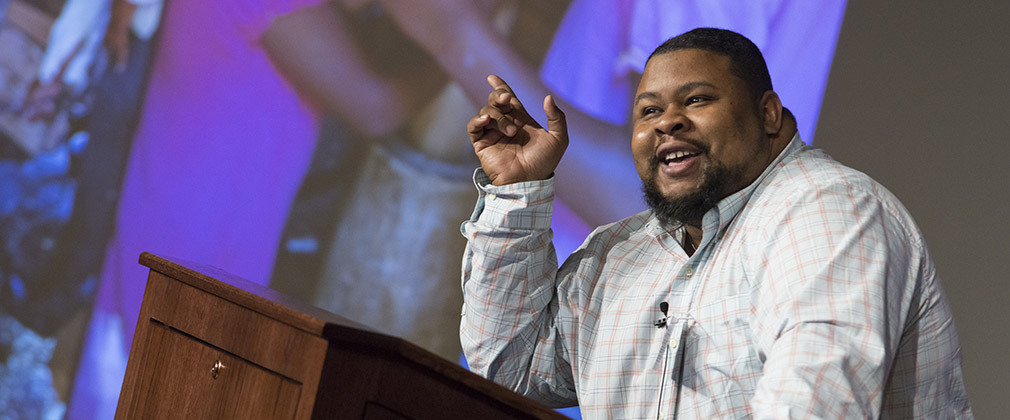Foodways with Michael Twitty
May 18, 2016
The whole human story, says Michael Twitty, is about people pushing out in search of food, the right food. “And everything in the black journey has to do with food, too,” he says.
Mr. Twitty spoke as a guest of the Johns Hopkins Center for a Livable Future at the Bloomberg School of Public Health, sharing some of his experiences as a food historian, as a cook, and as an African-American Jewish gay man exploring his cultural roots. Mr. Twitty, who cooks on plantations as a way to educate visitors about slavery and the culinary traditions of enslaved people, and who writes about Southern and African-American food on his blogs, Afroculinaria and The Cooking Gene, rocketed to social media fame in 2013 when he responded to celebrity chef Paula Deen’s use of a racial slur.
His beef with Deen was not so much the use of the slur, which he contended was hardly shocking, but her role in what he calls “culinary injustice” in the very profitable Southern food industry. Gentrified cities like Charleston, South Carolina, he says, offer tourists the fantasy of antebellum life, complete with low-country Southern cooking, without acknowledging the roots of that culture—from food to music to dance—that comes from generations of enslaved people. The owners and chefs of the most profitable restaurants in the “chitterling circuit” are white, he says, which constitutes a form of culinary appropriation.
“It’s all right for white people to cook black people’s food, but do it with respect,” he says. “Every year like clockwork I read the headlines for the articles, ‘Where are the black chefs?’ Well, we black people have a hard time getting the loans to open our own restaurants.”
“We don’t know where Black Southern and White Southern begins and ends,” he says. “Everybody in this room comes from enslaved people. And we’re all benefitting from slavery, whether it’s the Apple product you’re using, or the shoes you’re wearing, or you just ate Thai shrimp.”
Mr. Twitty cooks on plantations—one in particular, Stagville in North Carolina—in order to educate but also to encourage acknowledgment that slavery happened. He listed some of the euphemisms he’s encountered on plantation tours: Plantation mansions and slave quarters referred to as “historic houses.” The Civil War described as “The War Between the States” or “The War of Northern Aggression.” Or this statement from a tour guide, a co-ed in a hoop skirt: “Master Carter was very kind to his servants.”
Servants? Mr. Twitty finds the use of this word especially galling.
“The most painful truth about food and slavery,” he says, “is that the whole point was to extract the most amount of labor out of the black body using the least amount of calories.”
His own great-great grandfather, who witnessed the famous surrender at The Battle of Appomattox, Virginia, was an enslaved man who fanned white people as they ate their meals.
“I go to plantations and cook,” says Mr. Twitty. “I interpret the food of slavery. Reconciliation and healing begin in the kitchen. And this work [on plantations] is spiritually transformative.”
Five fifth-graders from The Green School of Baltimore, a public K–5 charter school, attended the talk and shared some thoughts afterwards.
“I learned a lot more than what I thought I would,” said Adrienne. “I didn’t know that an enslaved child would be beaten if he ate a biscuit that fell on the floor.”
“I didn’t know that women were given less food,” said A’shyra. “It’s really interesting,” said Wyatt. “He said what he wanted to say.”
“I didn’t know that children had to fan the white people,” said Kiyah. Molly echoed that: “I didn’t know about the fan. I think it’s really sad.”
- Christine Grillo
 Watch Video
Watch Video